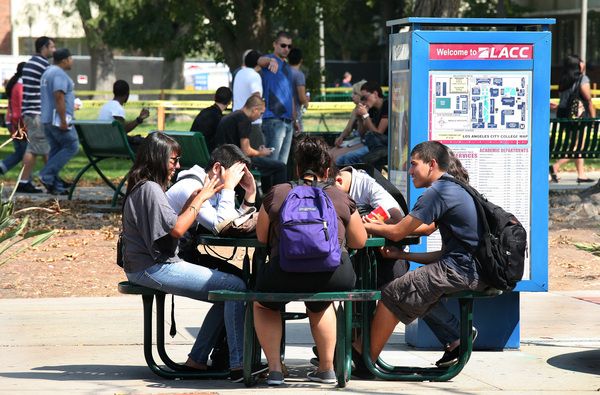Under a new law, community colleges and public universities in California must designate a liaison or intermediary with the dreamers in their university campuses from the 2020-21 academic year. However, higher education leaders regret that the law is not accompanied by funding to comply with it in community colleges.
Governor Gavin Newsom signed the Law AB 1645, presented by the Baldwin Park Assemblywoman, Blanca Rubio, who requires the appointment of the intermediary to help undocumented students and immigrants navigate the education system.
This includes community colleges, the California State University (CSU) and the University of California (UC).
“One of the main struggles as an undocumented student is having to go around a campus, explaining my situation, telling those behind the desk, 'I am undocumented' so they can give me the information I need in terms of payments and requests administrative, ”says Rosa Rodríguez, a public health policy student at Irvine Valley College.

"It may not seem like a big deal, but when you're undocumented, telling your status to the wrong person can cost you the life you've built in this country.", He says.
The new law requires public universities to create a resource center for dreamers with staff and resources to advise them on financial aid and academic opportunities to increase tuition, transfer and graduation rates between dreamers.
Some universities already have resource centers for dreamers such as the University of California, Los Angeles; the University of California at Davis; California State University in Los Angeles; California State University in Fullerton and California State University in Northridge. They provide informational workshops, legal clinics, information on the programs available to undocumented immigrants, counseling and support services.
“We need to support our dreamers and give them the educational support they need,” says Assemblyman Rubio.
“As an undocumented student, I know all too well all the struggles the dreamers have faced. AB 1645 will give these students a greater opportunity to overcome obstacles and have a successful educational experience, ”he says.
It is estimated that approximately 65,000 undocumented students annually graduate from high schools in the United States.

Since important legislative pieces have been approved for young immigrants as in California, AB 540 – the law that allows undocumented students graduated from California high schools to pay the same tuition fees as state residents – and DACA – Deferred Action For Childhood Arrivals, access to the university has become more accessible for undocumented students in the state.
However, in a recent study conducted by the Undocuscholars Project, many boys expressed concerns and frustrations with the lack of knowledge of university academic staff and administrators about the policies and services that support undocumented students.
The dreamers resource intermediary created by AB 1645 will save staff and resources time by optimizing all financial aid and academic opportunities available to AB 540 students.
The measure was supported by the Immigrant Human Rights Coalition (CHIRLA) and numerous groups.
"After five years of struggle, higher education institutions such as the community college system will have staff designated to assist undocumented and DACAmented students”, Says Joseph Villela, lobbyist of CHIRLA.
"This law will ensure the success of young immigrants, especially those who are graduating from high school and do not have access to DACA," he adds.
Lack of financing
Of the 111 community colleges in California, 35 already have resource centers for dreamers, and 19 campuses have a coordinator, whose salary is paid with a combination of their own resources and public and private scholarships.
Laura Metune, vice chancellor for government affairs, says they support hiring intermediaries and establishing centers on each campus, but it is estimated that this will cost $ 2.9 million, for which the law does not provide funds.
“Community colleges serve the largest number of undocumented students of any higher education system in California, but continue to receive the lowest funding per student. So providing adequate funding will be key to ensuring that schools can provide meaningful services to all students, including our undocumented students.", he claimed.
UC is ahead
Sarah McBride, a spokeswoman for the University of California said that each UC campus provides a variety of services to undocumented students, and has already designated links to support undocumented students on each campus with resources.
“Our support for undocumented students has long been, and in 2013 President Janet Napolitano launched the Undocumented Student Initiative, which provides funding to campuses for financial aid and student services for the unique needs of students. The program was expanded in 2016, ”he said.







